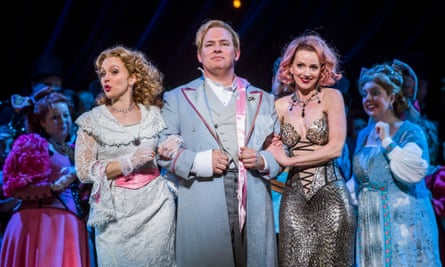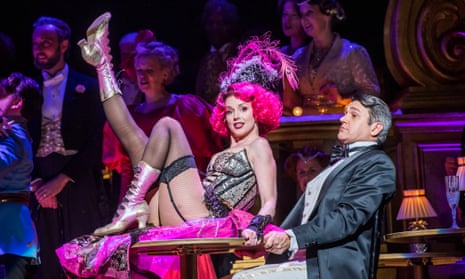The Merry Widow has become so familiar over time we tend to forget that at its premiere in Vienna in 1905, audiences and critics alike found it louche and indecent. Franz Lehár’s great comedy, erotic yet barbed, is set in the world of fin-de-siècle political high society, where money confers power over class and gender structures, and the fates of nations are essentially decided by sexual configurations among the diplomatic corps. Max Webster, director of English National Opera’s new production, describes it as “one of the best romcoms ever written”. It is, of course, considerably more than that, and his staging attempts to capture its subversive spirit as well as its glamour.
The result, however, can be heavy-handed. The new translation, with the book by the playwright April De Angelis and lyrics by Richard Thomas, a co-creator of Jerry Springer: The Opera and librettist for Mark-Anthony Turnage’s Anna Nicole, is certainly ribald, but also places an almost relentless emphasis on the operetta’s subtext. That Hanna Glawari’s millions permit her autonomy in, and control over, a men’s world, is perfectly clear from the outset and doesn’t need to be so heftily stressed. Danilo, we’re told, “can’t articulate his emotions”, while Valencienne is having therapy to resolve her conflict between being a respectable diplomat’s wife and having an adulterous affair with a French aristocrat. The feminist slant is strong, with the grisettes at Maxim’s singing of their boredom with sexual objectification, while De Angelis and Thomas have made the national symbol of Pontevedro a beaver, with every double entendre the word implies.
Webster’s staging combines gaudiness with panache. When Sarah Tynan’s Hanna makes her grand entrance at the embassy ball, she looks like both Marilyn Monroe in Gentlemen Prefer Blondes and Madonna in her Material Girl take on it, while a bevy of Hanna-Marilyn-Madonna lookalikes haunt Nathan Gunn’s Danilo as he suffers the after-effects of a night on the tiles. Camp hunks and tap-dancing beavers form part of the entertainment Hanna later offers to her guests, which contrasts nicely with the grisettes’ tawdry bump and grind. There’s a hilarious scene in a urinal, where the men soothe their wounded masculinity with a contest to see who can piss the highest. Some of it grates against the score, though: the sight of Robert Murray’s Camille and Rhian Lois’s Valencienne crawling under a table to consummate their illicit passion sits very uneasily with the seductiveness of Lehár’s music at that point.

That it works is largely due to Tynan and Gunn, who are entirely credible, and at times extremely touching, as exes trying to escape the mess of the past and find a future together. He’s very attractive, if world-weary. She’s knowing, affectionate, sings with great elegance, and is well up to the considerable theatrical demands that Webster places on her. Murray sounds suitably ardent, Lois does fine things with A Highly Respectable Wife, and Andrew Shore, impeccable as always, makes a fine and funny Baron Zeta. The conductor, Kristiina Poska, could sometimes press forward with a bit more urgency, but the playing from the ENO Orchestra is silky smooth and sensuous. Opening night problems with the sound system, intended to amplify the dialogue though not the singing, but sometimes catching the start of numbers, will hopefully sort themselves out during the run.
At the Coliseum, London, until 13 April.

Comments (…)
Sign in or create your Guardian account to join the discussion